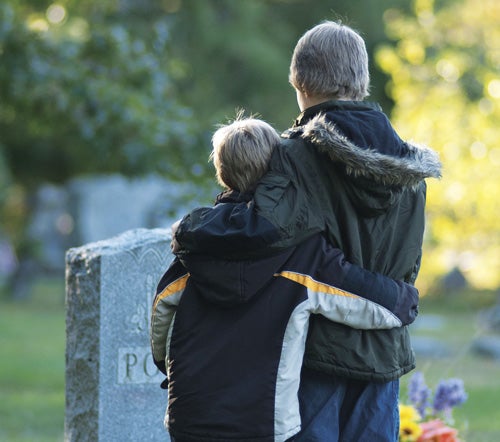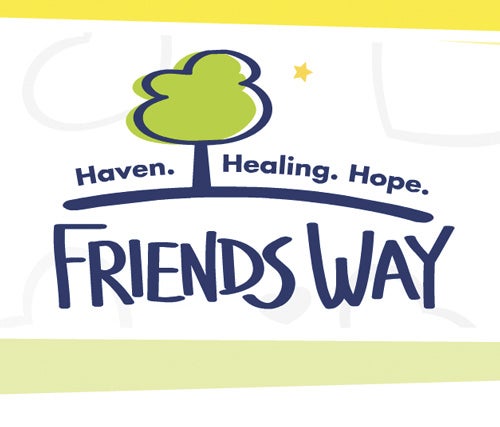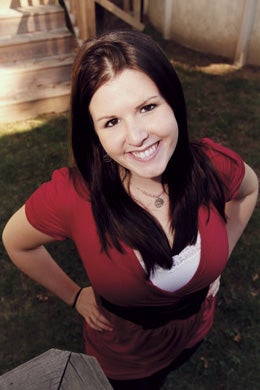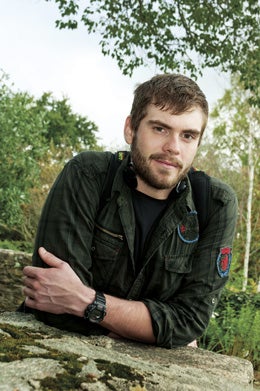Helping Children Grieve

What do you say to a child who has lost a loved one? Probably nothing. “It’s the elephant in the room,” says Carolyn Hames, associate professor of nursing, who focuses on grief and loss in children and adolescents.
“Adults want to protect children and not expose them to painful events. It’s the single biggest error. The result is we disenfranchise children. When there’s a death in the family, kids learn their family’s cultural norms for grief and mourning by observing adults. Adults are their role models; when they don’t talk about the loss it compounds the children’s belief that things must be really bad. So bad, that it’s unmentionable. That which is unmentionable is unmanageable. Death becomes frightening to them, and they don’t ask questions.”
One out of five American kids will have a parent die by the time they graduate from high school. Many more experience other significant types of loss. “It is very possible that a significant amount of high risk behavior, acting out, school failures, and juvenile delinquency are triggered by childhood and teen losses that are not recognized or grief that is not supported,” said Hames.
Children grieve differently than adults, and they mourn differently depending on their age, according to Hames.
“Grief is limited by a child’s developmental stage,” says the expert. “Children understand death, loss, and grief only to the extent of their capacity at a given point in time. As they mature, they reprocess the loss with expanded insight and understanding. So, in effect, they re-grieve.”
Developmental stages in children, says Hames, generally fall into four categories:
Toddlers: Egocentric, “Daddy died so who will read my book?”
Pre-Schoolers: Begin feeling empathy and guilt, “Mommy died because I didn’t eat my peas.”
School Aged: Understand permanence, that things don’t reverse themselves, emerging fears and curiosity, “A bad thing has happened to my family so I need to be tough.”
Teenagers: Who am I? Has need to fit in, does not want to be different, will pretend just to be normal, “I’m fine. I don’t need any help.”
Although there is very little literature on the subject, Hames believes that babies grieve. “If they are old enough to attach, they are old enough to grieve,” says Hames, whose early professional experiences with death as a pediatric nurse at Children’s Hospital Boston compelled her to want to help families deal with loss after they walked out of the hospital doors.
Grieving Styles
Everyone grieves differently, but there are two distinct styles of grieving:
• Intuitive Grieving: An intuitive griever is someone who is reflective and shares thoughts and emotions with others.
• Instrumental Grieving: An instrumental griever is someone who releases grief by doing and thinking. Reactions are more physical, like laying stones to create a memorial walk.
One style is not better than the other. “Personalities and styles of grief should be recognized and honored,” says Hames, noting that grieving styles can clash among family members and unintentionally create roadblocks to healing. For example, an intuitive child would not thrive in a family environment where no one talks about the deceased and where all pictures of the deceased have been removed. Or the teenager who vents his anger and feeling of loss through sports and comes home to a mother who continually asks him: How do you feel? Husbands and wives can and do clash in styles, which can create conflict.
Secondary Loss
A primary loss is followed by other losses, referred to as secondary loss. For instance, one spouse dies. The couple always took a summer vacation with another couple. However, the next summer, the widow doesn’t get invited to go along.
Children also experience secondary loss. For example, if a father dies, it might mean that the family home has to be sold. The move might require the child to go to a different school. Family income is cut in half. Mom may have to work or work longer hours. These are compound losses—loss of friends, loss of the familiar, and loss of time with the surviving parent.
Funerals and Wakes
Should adults bring children to wakes and funerals? “If the child is old enough to go on a family picnic, the child is old enough to attend a family funeral,” says Hames. “However, the child needs to be prepared. If a child is going out on Halloween night for the first time, adults typically explain what will happen and what to expect. The same should be true for funeral rituals. After the explanation of what will happen, I firmly believe that a child should be given a choice whether or not to attend.
“So many teachable moments get lost when there’s no discussion. I know an 11-year-old child whose dad died. The Irish wake and the funeral that followed involved a lot of stories and laughter about the deceased. Misunderstanding these cultural rituals, the child grew angry, mad that people were making fun of his dad.”
So what do you say to a child who has lost a loved one? “Have the guts to mention the deceased,” advises Hames. ”That gives the child permission to talk, lets him or her know you are willing to have a conversation, and honors the memory of the loved one. The best way to start the conversation is to share a memory. One of the things children fear most is that they—and others—will forget their loved one.”
By Jan Wenzel ’87

Healing Time at FRIENDS Way
Kaitlyn Bouchard was 11 when she lost her father. Matthew Banno served with the U.S. Marines in Iraq and was exposed to death on and off the battlefield. Both URI students have been able to use their experiences by helping children and adolescents cope with loss.
They do that by participating at FRIENDS Way a children’s bereavement center, in Warwick, R.I., which Carolyn Hames co-founded in 2000.
FRIENDS Way is a safe place for children and adolescents age 3 to 19 to explore and express their feelings. Trained volunteer facilitators help normalize the grief process through age appropriate creative activities. Children and their caregivers meet with FRIENDS Way staff and volunteers, some of whom are licensed clinicians, every other week through the school year. The organization also runs a weekend camp in July. No fees are charged. The non-profit relies on community involvement and donor support.
Picturing Grief
Kaitlyn Bouchard was 11 and about to complete sixth grade at Hopkins Hill elementary school in Coventry when her dad died unexpectedly.
 She desperately missed spending every other weekend with him. No more parading down the streets with matching sweatshirts, no more Sunday breakfasts at the local diner, no more midnight runs for tasty snacks, and no more gorgeous Valentine’s Day bouquets from him.
She desperately missed spending every other weekend with him. No more parading down the streets with matching sweatshirts, no more Sunday breakfasts at the local diner, no more midnight runs for tasty snacks, and no more gorgeous Valentine’s Day bouquets from him.
She also missed his lessons about values and life: Education is important, say no to drugs—he quit smoking and regretted ever starting. He often told her “life is short.” Little did she know how short his would be.
“I’m an only child, and my mother had remarried a year before my dad passed away, so I often felt alone in my grief,” she says. “I didn’t have anyone else who was going through the same loss. “
Kaitlyn’s transition to middle school was rough for her emotionally and academically. “I don’t know what I would have done without FRIENDS Way,” says the senior film/media and art double major.
She attended her first meeting the fall after her father’s death. “It helped me open up to others who were dealing with the same loss. A lot of people came and went, but I stayed to help others by sharing my story,” she says.
She told that story in a music video called Father’s Day, which faculty members noted when they awarded her the Joyal Film Award in Film/Media Production for overall quality of her production work.
Father’s Day from Kaitlyn Bouchard on Vimeo.
In the video, Kaitlyn explores her loss. Her young cousin, Railey, plays Kaitlyn as a child. Railey was born a few months after Kaitlyn’s dad died. The song “Father’s Day” by Kaitlyn’s favorite band, Stephen Kellogg & the Sixers, plays throughout the video.
Kaitlyn contacted the band and made arrangements to show the video to the members when they came to Newport for a show. “We huddled around my laptop and watched; I was so nervous,” said Kaitlyn. “They all loved it. Stephen Kellogg actually cried on my laptop while watching it. I couldn’t believe it. They told me that they wanted to release it as their official video for the song, and they gave me verbal permission to submit it to film festivals.”
A Special Person
Matthew “Matt” Banno, a 25-year old Army and Marine Corps veteran, took Carolyn Hames’ honors course, Loss in the Lives of Children and Adolescents, completed its service learning component at FRIENDS Way, got hooked, and became a trained facilitator.
 “When I first went there, I was kind of nervous. I ended up going along with older teenagers (14 to 18 years old) and taking part in their group,” recalls the biology and psychology double major.
“When I first went there, I was kind of nervous. I ended up going along with older teenagers (14 to 18 years old) and taking part in their group,” recalls the biology and psychology double major.
“I figured that I would be able to relate to some of their issues as teenagers since high school wasn’t all that long ago for me,” he says.
Matt, a Coventry resident, continues to work with the same age group, facilitating discussions. “It’s difficult at times to hear and see a child grieving over a loss, but I have made a certain level of commitment to the kids to be there for them in a supportive and listening way.”
Matt shares some of himself during those discussions. “At FRIENDS Way, we refer to the person that the children have lost as their ‘special person.’ When I referred to my special person, it’s Josh. Josh died by suicide a little over a year ago, unable to deal with his experiences in Iraq. I had a hard time dealing with his death; at times I still do. The best resources that I always had, and still do to this day, is fellow marines and soldiers I served with. We understand each other like no third party ever could. I have found that I have been able to apply some of what I have learned when talking to friends and fellow veterans.”
Matt plans to pursue a graduate degree in psychology after he leaves URI; “I think my knowledge and experience with bereavement will absolutely fit into those plans. Even if I were not in the mental health field, they would fit into my life in some capacity.
Death is something we will all deal with at some point, and I feel confident in my ability to deal with it myself and help others deal with it since beginning my time at FRIENDS Way.”
 Home
Home Browse
Browse Close
Close Events
Events Maps
Maps Email
Email Brightspace
Brightspace eCampus
eCampus


